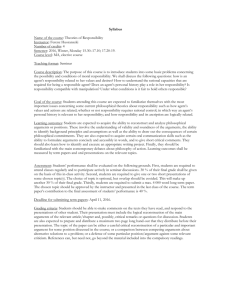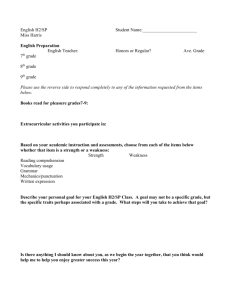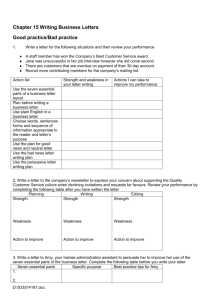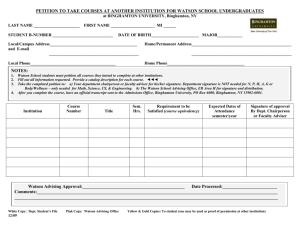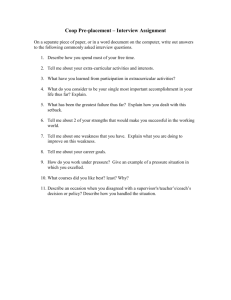Class Notes
advertisement
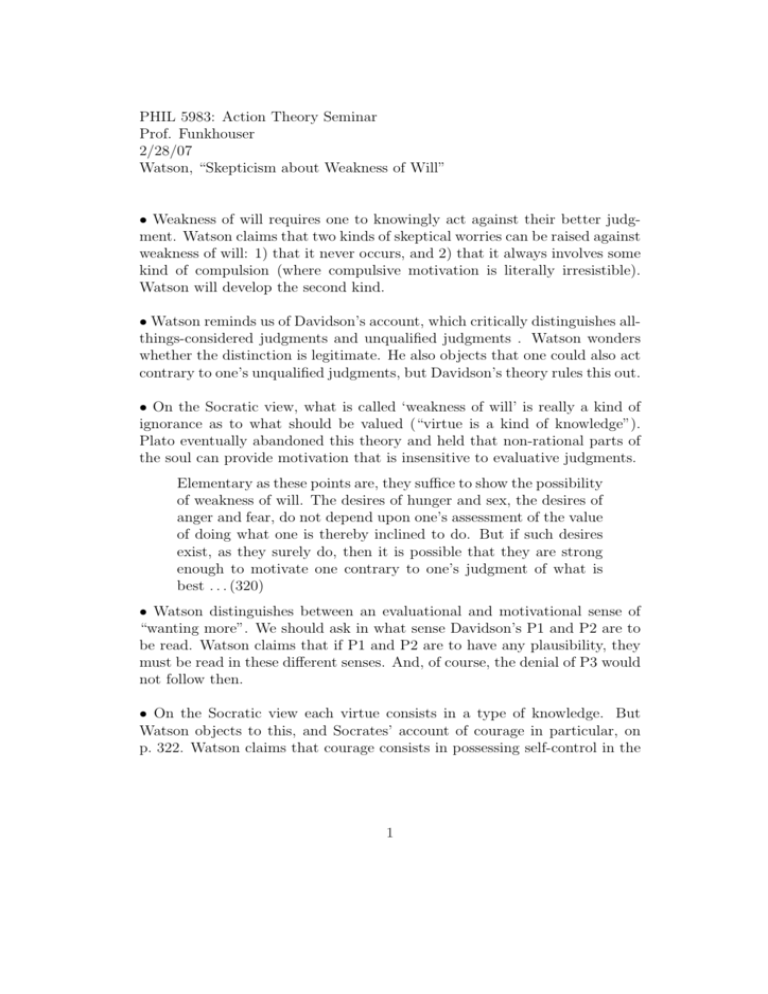
PHIL 5983: Action Theory Seminar Prof. Funkhouser 2/28/07 Watson, “Skepticism about Weakness of Will” • Weakness of will requires one to knowingly act against their better judgment. Watson claims that two kinds of skeptical worries can be raised against weakness of will: 1) that it never occurs, and 2) that it always involves some kind of compulsion (where compulsive motivation is literally irresistible). Watson will develop the second kind. • Watson reminds us of Davidson’s account, which critically distinguishes allthings-considered judgments and unqualified judgments . Watson wonders whether the distinction is legitimate. He also objects that one could also act contrary to one’s unqualified judgments, but Davidson’s theory rules this out. • On the Socratic view, what is called ‘weakness of will’ is really a kind of ignorance as to what should be valued (“virtue is a kind of knowledge”). Plato eventually abandoned this theory and held that non-rational parts of the soul can provide motivation that is insensitive to evaluative judgments. Elementary as these points are, they suffice to show the possibility of weakness of will. The desires of hunger and sex, the desires of anger and fear, do not depend upon one’s assessment of the value of doing what one is thereby inclined to do. But if such desires exist, as they surely do, then it is possible that they are strong enough to motivate one contrary to one’s judgment of what is best . . . (320) • Watson distinguishes between an evaluational and motivational sense of “wanting more”. We should ask in what sense Davidson’s P1 and P2 are to be read. Watson claims that if P1 and P2 are to have any plausibility, they must be read in these different senses. And, of course, the denial of P3 would not follow then. • On the Socratic view each virtue consists in a type of knowledge. But Watson objects to this, and Socrates’ account of courage in particular, on p. 322. Watson claims that courage consists in possessing self-control in the 1 face of motivations brought about by fear. The motivations brought about by fear are contrary to our judgment of what should be pursued. Self-control is a more general virtue: As I see it, then, the virtue of self-control is the capacity to counteract recalcitrant motivation, that is, motivation which is contrary to one’s better judgment. (323) • Watson then turns to the topics of compulsion and weakness. Example: the woman who has another drink. Watson distinguishes three pre-analytic possibilities: (1) recklessness, (2) weakness, and (3) compulsion. In (1), the woman knows what she is doing but accepts the consequences. Her choice is to get drunk or risk getting drunk. She acts in accordance with her judgment. In (2) the woman knowingly takes the drink contrary to her (conscious) better judgment; the explanation for this lack of self-control is that she is weak-willed. In (3), she knowingly takes the drink contrary to her better judgment, but she is a victim of a compulsive (irresistible) desire to drink. (324) But, the second skeptical worry for weakness of will challenged the distinction between (2) and (3). ◦ Examples of psychological compulsions could include things like manias, phobias, and addictions. Again, compulsion requires irresistibility. ◦ Watson makes an interesting comment about weakness of will being an explanatory concept. To identify behavior in this way is to offer a minimal kind of explanation: one acts contrary to one’s better judgment because one is weak; one yields to temptation, allows oneself to give in to appetite, and so forth. (326) But to act compulsively is to be motivated to act in a particular way regardless of one’s evaluative judgments. Watson claims that this is also true of the weak-willed, so weakness of will is a kind of compulsion. But is this at all plausible? Well, is there a difference between having a weak will and having too strong of a desire? ◦ Significantly, Watson claims that there does not seem to be a way to judge the strength of desires but by looking at the resultant action. But, is this at 2 all plausible (or even relevant)? ◦ So, according to Watson, if compulsive behavior is not free, then neither is weak-willed behavior. ◦ One could certainly be skeptical of the very possibility of an irresistible motive. But, Watson sees no reason to think they are impossible. • Note the distinction between the continent and temperate person. (330) • Hypothesis: Maybe the desires driving compulsion are those that could not be resisted by a normal amount of self-control. But, the desires that the weak-willed fail to resist could be resisted by one with a normal amount of self-control. This response also seems to presuppose, if it is to be plausible, that the weak-willed could have a normal amount of self-control. ◦ So, according to this hypothesis, behavior is compulsive only relative to some standard of normalcy. But, this shouldn’t be problematic. Our standards for physical weakness are also relative to the normal standards for, say, a given species, age, etc. Note the comments on shame, on p. 333. ◦ Note that, on this hypothesis, the weak-willed might be unable to resist her desire at the time of her weakness (though she could have resisted had she, say, trained herself better at a younger age). Weakness of will is very much like negligence in this regard. The weak-willed can be held responsible for not adequately developing a capacity. ◦ How would the common account explain the drinker’s failure to resist the urge for another drink? Watson considers two possible answers, each of which he argues is unsatisfactory: “(1) She chooses not to. (2) Her effort to resist is culpably insufficient.” (336) Against (1), Watson argues that weakness of will requires acting contrary to your choice. Against (2), Watson is skeptical as to what the lack of effort could consist in. It is certainly not a misjudgment as to what must be done to resist the urge for a drink. ◦ So, Watson concludes that the common view is wrong and that the weakwilled possess an irresistible desire. 3

